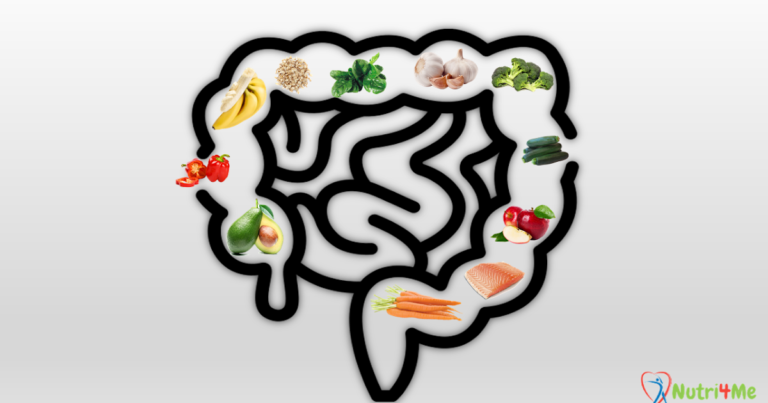Struggling with digestive issues or gut imbalances? Your gut is home to trillions of bacteria, and the food you eat plays a key role in maintaining a healthy balance of beneficial bacteria in your gut microbiome. Incorporating the right foods into your diet can not only support your digestive system but also improve your overall health and well-being.
In this post, Nutri4me explores the best foods for a healthy gut, including high-fiber foods, probiotic foods, prebiotic foods, omega-3 fatty acids, bone broth, fermented foods, and green leafy vegetables.
Whether you’re looking to relieve digestive issues or optimize your gut health, these nutrition tips can help you achieve a healthier gut and improve your quality of life.
Definition of intestine
First things first, let’s demystify the gut: Your gastrointestinal tract, affectionately known as your gut, stretches from your mouth to your derriere, handling the critical jobs of digestion, nutrient absorption, and waste elimination.
Imagine a teeming ecosystem filled with trillions of microorganisms, which collectively form the remarkable gut microbiome, these tiny allies play an extraordinary role in keeping your gut healthy, influencing everything from digestion to immune function.
The best foods to include in your diet for a healthy gut
- Foods rich in fiber:
Fiber is a type of carbohydrate that cannot be digested by the body, but is important for maintaining a healthy digestive system.
There are two types of fiber: soluble and insoluble.
Soluble fiber it dissolves in water and forms a gel-like substance that slows digestion and helps regulate blood sugar levels.
Insoluble fiber it does not dissolve in water and adds bulk to the stool, helping to prevent constipation and maintain bowel regularity.
Fiber is essential for maintaining healthy digestion and promoting the growth of beneficial bacteria in the gut. Some examples of fiber-rich foods include fruits, vegetables, legumes, whole grains, and nuts.
- Probiotic foods:
Probiotics are live microorganisms that can benefit the host when consumed in sufficient amounts.
They are often referred to as “good” or “friendly” bacteria, as they help maintain a healthy balance of microorganisms in the gut.
Probiotics can improve gut health by reducing inflammation, supporting the immune system, and improving nutrient absorption.
Probiotics are live bacteria that can provide many health benefits, including improving digestion and supporting a healthy immune system. Some examples of probiotic foods include yogurt, kefir, kimchi, sauerkraut, miso, and tempeh.
- Prebiotic foods:
Prebiotics are a type of fiber that feed beneficial gut bacteria, promoting their growth and survival. Some examples of prebiotic foods include garlic, onions, leeks, asparagus, bananas, and oats.
- Omega-3 fatty acids:
Omega-3 fatty acids are anti-inflammatory and can help reduce inflammation in the gut. They can be found in fatty fish such as salmon, sardines and mackerel, as well as nuts and seeds such as chia seeds, flax seeds and walnuts.
- Bone Broth:
Bone broth is made by boiling bones and connective tissue from animals and contains collagen, gelatin and amino acids that can help repair and support the lining of the gut.
- Fermented foods:
Fermented foods like kombucha, kefir and kimchi contain beneficial bacteria that can improve gut health. They also contain enzymes that can help break down food and improve digestion.
- Green leafy vegetables:
Green leafy vegetables such as spinach, kale and collard greens are rich in vitamins and minerals that support gut health. They also contain antioxidants that can reduce inflammation in the gut.
It’s important to note that everyone’s gut microbiome is unique, so what works for one person may not work for another.
It’s always a good idea to listen to your body and work with a healthcare professional or registered dietitian to determine the best diet for your individual needs
What foods should you avoid?
As we begin our quest for a healthy gut, it’s important to avoid foods that can wreak havoc on our digestive paradise, keep the following in mind:
Processed FOODS: The realm of packaged snacks, fast food and sugary treats may seem tempting, but these culprits disrupt the delicate balance of your gut microbiome, leaving your gut inflamed and unhappy.
Artificial Sweeteners: The illusion of guilt-free sweetness hides a dark secret. Artificial sweeteners like aspartame and sucralose can disrupt your gut microbiome and increase your risk of metabolic disorders, it’s wise to choose natural sweeteners like stevia or honey in moderation.
Unlock the power of a healthy gut and unleash a world of vibrant wellness! By embracing the right foods, you can nourish your gut and trigger a ripple effect of vitality throughout your body.
So let your taste buds dance with fiber-rich foods, probiotic wonders, prebiotic delights and omega-3 treasures. Remember, every bite is an opportunity to optimize your gut health and improve your overall well-being.
Say goodbye to digestive distress and hello to a thriving gut and a vibrant life, get started today and embark on an intense journey to a healthier, happier you!
